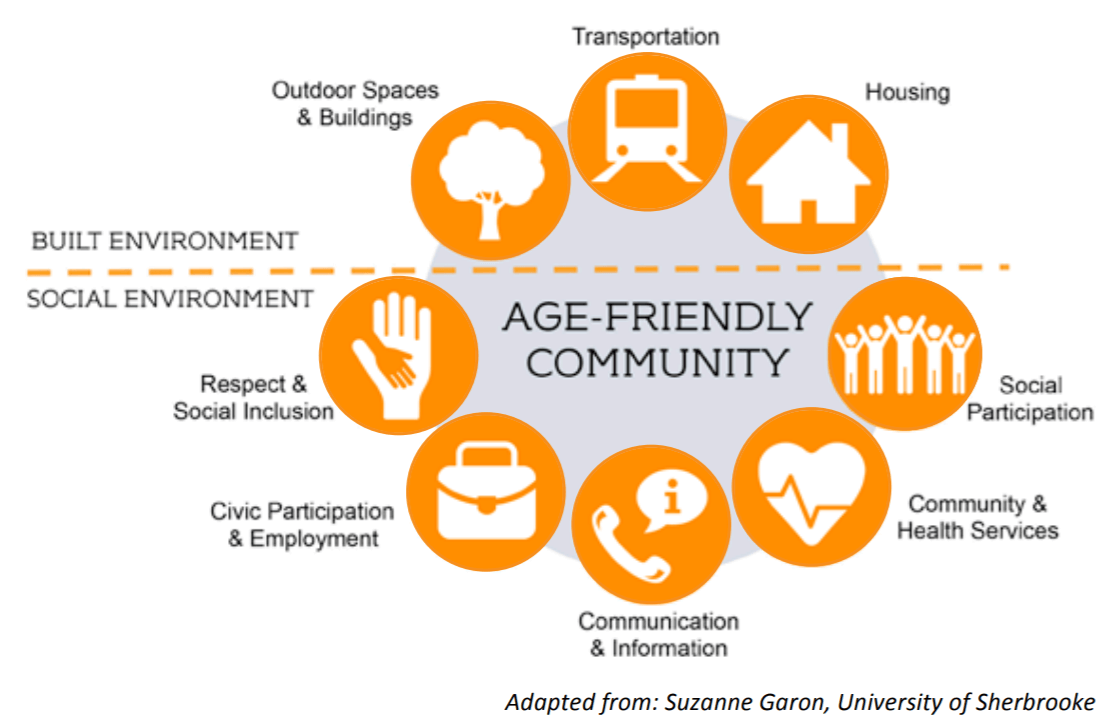LifePath’s New Initiative Aims to Make Our Communities More Age & Dementia Friendly

LifePath is embarking on an exciting new initiative with the aim of making communities in Franklin County and the North Quabbin region more age friendly and dementia friendly. Unlike many of our direct service programs, this project will target long term, policy and systems level change to both the built environment and the social environment. So, what does it mean to be more age and dementia friendly? Why is it important to do this work now? And how can you take part in transforming your community?
Due to the tremendous advances achieved in technology, modern medicine, and public health over the past century, people today are generally living much longer and healthier lives. This unprecedented jump in life expectancy, coupled with a decrease in fertility rates, means that we are witnessing new trends in what the population looks like. By the year 2035, people aged 65 and over in the United States will outnumber those under the age of 18 for the very first time. This shift will happen sooner in Massachusetts and has, in fact, already happened in Franklin County (Figure 1). 1

These changes in the demographic makeup of our region are bringing forth new sets of opportunities and challenges. As we grow older, we are gaining momentum and building up valuable experience and collective wisdom, and we have more time to contribute to the success of our communities. At the same time, our needs and priorities are also changing in significant ways, while our public policy and infrastructure have not kept pace to account for these changing needs. That is why it is very important to recognize and celebrate the services provided to older people in our region by Senior Centers, Councils on Aging, local governments and nonprofits, and to continue identifying more ways to combat ageism and make our communities work better for everyone, no matter their age. One of these ways is by joining the Age-Friendly Communities movement.
Initiated by the World Health Organization, the Age-Friendly Communities movement aims to help both urban and rural communities transform in ways that respond to the needs of the most vulnerable.
Initiated by the World Health Organization, the Age-Friendly Communities movement aims to help both urban and rural communities transform in ways that respond to the needs of the most vulnerable. AARP (formerly called the American Association of Retired Persons), which administers the program in the United States, believes that these communities “should provide safe, walkable streets; age-friendly housing and transportation options; access to needed services; and opportunities for residents of all ages to participate in community life.”2 Indeed, communities that approach planning with older people in mind, and at the decision making table, tend to be more accessible and work better for everyone else too.
AARP has also identified 8 domains of livability that can be used by communities as a framework to organize their work and prioritize their most urgent needs while on their way to becoming more age-friendly (Figure 2). 3 This framework offers a lot of flexibility for towns to focus on all or just some of these domains, combine them when deemed appropriate, or even add a new domain.

So far, there are hundreds of municipalities and six states across the US that have joined the Age-Friendly Communities Network, including Massachusetts. Within our state, almost 70 municipalities have received the designation, although Deerfield remains the only one in the Franklin County and the North Quabbin region to do so. Getting enrolled in the network is only the first step toward achieving liveability, and represents the town’s commitment to actively work to increase the age-friendliness of the community. The full process takes 3 to 5 years and includes 4 major phases: enrollment, conducting surveys to assess needs, creating an action plan, and implementation.
The good news is that LifePath has received a grant to initiate and coordinate Age-Friendly work in our service area. Moreover, we will be integrating dementia-friendly work in this project to ensure that our age-friendly efforts also meet the needs of people living with dementia and their caregivers. This means that LifePath will play the role of a catalyst, convening and connecting different stakeholders in our communities to form action teams that will lead the project. Stakeholders will include local officials, Councils on Aging, the business community, civil society organizations, and any interested residents that want to help shape the direction and future of this project. In order to be successful, it is vital that we create diverse and multisectoral teams that are plugged into different facets of life in the region, so that we can generate accurate assessments of needs and effective action plans addressing them.
As a first step, we will be holding two introductory Zoom meetings to provide more information about the project, answer lingering questions, listen to your comments, and start to build our action teams. The meetings are scheduled for Monday, October 5, at 10:30 a.m., and Wednesday, October 7, at 5:30 p.m., and will last for one hour. To register for one of these meetings, please contact Nour Elkhattaby Strauch, Age-Friendly Program Manager at LifePath, at nelkhattabystrauch@lifepathma.org or 413-773-5555 x2299.